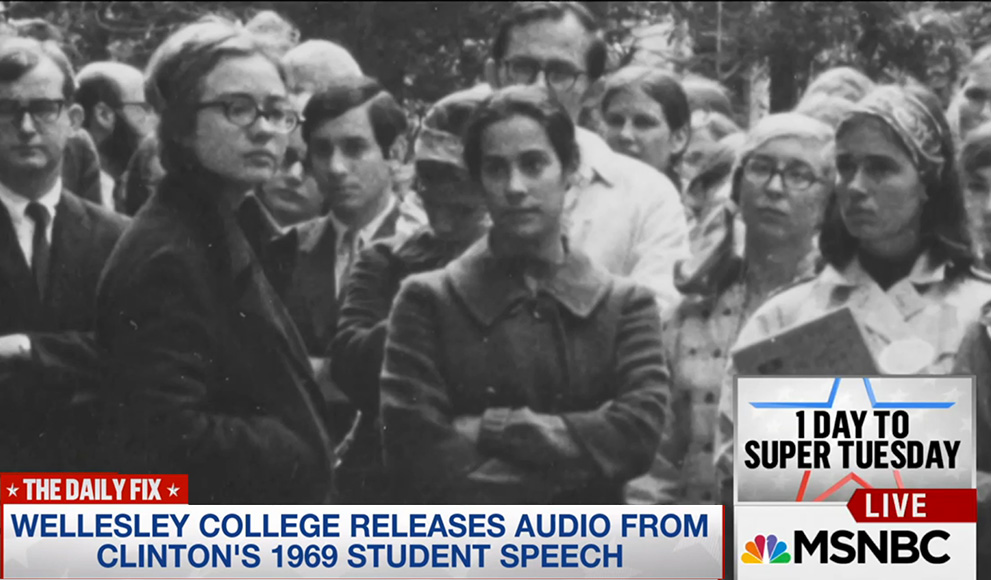From Stephen Colbert to the New York Times, National Media Feature Hillary Clinton's 1969 Student Commencement Speech

During a week that witnessed Hillary Rodham Clinton '69 make history as the first woman to be the presumptive presidential nominee of a major political party, media from Stephen Colbert of The Late Show to the New York Times reported on a newly-released audio recording of her 1969 student commencement speech. Clinton's classmates selected her as the first-ever student speaker at Wellesley, a tradition that continues to this day.
The audio recording was released as part of a collection of multimedia content of Clinton's years at Wellesley, prompting national coverage, a viral social media moment and a nostalgic look back at her years as a student here. While the College does not endorse political candidates, we were honored to articulate the Wellesley community's great pride in our alumna and her extraordinary accomplishment. And print, online, broadcast and social media all showed intense interest in hearing the presidential candidate's voice as a 21-year-old student leader as she spoke about the women's movement, social issues and political engagement.
Stephen Colbert, host of the The Late Show, mixed humor with the history that the audio evoked during his opening monologue. Colbert said, "[The audio] is all over the internet right now," before playing a clip in which Rodham says, "We feel that for too long our leaders have viewed politics as the art of the possible. And the challenge now is to practice politics as the art of making what appears to be impossible possible." Colbert said, "She has done it. She has made the impossible, possible. She is a woman who has clinched the presidential nomination." Colbert then joked, "That's something you'd only see in a sci-fi novel or in any other country in the world."
The 1969 speech was also referenced by some media as they highlighted the historic nature of Clinton's achievement. A U.S. News and World Report article quoted Alan Schechter, emeritus professor of political science and Clinton's senior thesis adviser. Schechter said, "This is so historic. I was thinking – it took 70 years from the first women's rights convention in 1848 to pass the right to vote [for women] and then 45 more years to pass the first law prohibiting discrimination on the basis of gender. Now, we may be electing the first female president."
A New York magazine article entitled "Hillary Clinton Just Shattered the ‘Highest, Hardest Glass Ceiling," said, "[A]s Clinton said in her graduation speech at Wellesley College in 1969, 'We found—as all of us have found—that there was a gap between expectation and realities. But it wasn't a discouraging gap, and it didn't turn us into cynical, bitter old women ... It just inspired us to do something about the gap.' Since last April, Clinton has been doing something about that gap. And with her presumptive nomination tonight, she's finally shattered ‘that highest, hardest glass ceiling.'"
National media that covered the story included: the New York Times, the Washington Post, Politico, MSNBC (including coverage by anchor Andrea Mitchell), People Magazine, Huffington Post, Time, Newsweek and U.S. News & World Report, among others.
